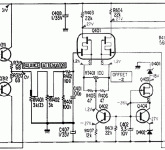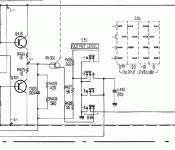john curl said:It is a shame that you do not read up on Richard Heyser's philosophy. It is on the net. You 'might' learn something new and useful. Something that I learned from him 40 years ago.
Oh I prefer Hume and Russell, but I fully understand you here - the delusion of one man cancels that of another.
BTW, and was that a yea or a nay on the Porsche? I’m keeping an “open mind” here.
stinius said:[snip]And how would you use the steps from 0dB to minus ? dB?
Stinius
Not sure I understand you, but obviously the operating range of the control you'd want would depend on the sensitivity of your amp/speaker combination. So you need to keep it fairly wide and flexible for general use.
Jan Didden
Well, at least it wasn't boring 24 hours ago. I hope for more information exchange like that.
janneman said:
Not sure I understand you, but obviously the operating range of the control you'd want would depend on the sensitivity of your amp/speaker combination. So you need to keep it fairly wide and flexible for general use.
Jan Didden
I like the idea of a small-ish range of control for everyday use, with a wider range that may be preset "inside the box". This is inline with the previous suggestion of two switches with coarse and fine grain settings.
It could perhaps accomodate a preset that is intended to set the system up for different systems and after that leave the external fine setting for the listener.
Then again , based on a few minutes thinking and asking myself "how often do I listen at any different volume setting?" Answer if I am remembering truthfully is that it depends on mood and time of day. If no-one else is around and mood is right then very loud, otherwise late at night very quiet, otherwise "normal setting".
So fo me that is essentially THREE settings.
1. selfishly loud for rock/punk/classical/piano
2. normal use for everything else
3. late night listening blues/jazz
That's well and good if a volume control is a volume control, but it's not- it's a gain control. Source material varies in recorded level and dynamic range...
Agreed, and I was thinking of three settings plus the fine setting that should cope. This based on the way I use my syste and all the material and sources I have. It may vary more widely for others but then perhaps the sources should be adjusted at setup time ?
alansawyer said:Agreed, and I was thinking of three settings plus the fine setting that should cope. This based on the way I use my syste and all the material and sources I have. It may vary more widely for others but then perhaps the sources should be adjusted at setup time ?
Yes. My favorite Sony TA-E88 has -10dB and -20dB switch in addition to the vol control. Often, I only use the switch and the vol control isn't touched for days.
Jan Didden
pooge said:
So? What's not going to involve a contact of some sort?
LDR. My point here was that you still need a switch of the same quality as with the other methods.
You didn't get my drift. I'm not talking about warming your room here. Attenuation through resistance is changing the signal to heat and dissipating its power. Transformers maintain the power.
Assuming a 2V RMS input, a 10K pot would have to dissipate 0.0002W. I can live with that.
Ideally yes, and transformers shouldn't have to deal with much. Would you rather block with a capacitor?
I would rather design the DC out of the circuit.
For multiple mixed inputs, without extra switch contacts? What else can do all these functions? Some of the other suggestions here cost just as much.
That last one has already been answered by Peter Daniel.
These look good I think:
http://www.acoustic-dimension.com/attenuators/attenuators-main.htm
ladder type and 41 steps, but quite big.
http://www.acoustic-dimension.com/attenuators/attenuators-main.htm
ladder type and 41 steps, but quite big.
back in the old days.....
As a child i remember a valve radio,a three position volume switch,and another for loud or quiet
Jan
You posted a bit about the QTC pill doodads yesterday.
I used a pair of these as pressure variable resistors in series with the inputs to a power amp,Worked well I thought,for their crudity.
Their hysteresis would drive a control freak Mad though.
regards
Max
ps Perhaps using them under constant pressure as varied resistors,but then it"s back to switches.
pps apologies for refering to Qtc again,Thought everyone would know about them.
hello peoplesjanneman said:
Yes. My favorite Sony TA-E88 has -10dB and -20dB switch in addition to the vol control. Often, I only use the switch and the vol control isn't touched for days.
Jan Didden
As a child i remember a valve radio,a three position volume switch,and another for loud or quiet
Jan
You posted a bit about the QTC pill doodads yesterday.
I used a pair of these as pressure variable resistors in series with the inputs to a power amp,Worked well I thought,for their crudity.
Their hysteresis would drive a control freak Mad though.
regards
Max
ps Perhaps using them under constant pressure as varied resistors,but then it"s back to switches.
pps apologies for refering to Qtc again,Thought everyone would know about them.
Steve Dunlap said:
That last one has already been answered by Peter Daniel.
Are you refering to the post where he said it was his favorite volume control?
gk7 said:These look good I think:
http://www.acoustic-dimension.com/attenuators/attenuators-main.htm
ladder type and 41 steps, but quite big.
Hi gk7,
Indeed, looks good, though I'm not sure if I can trust a company that also sells BS.
Regards,
Edmond.
G.Kleinschmidt said:
claims of audible differences between ppb variations in resistor brands are about as credible as revelations regarding the second coming of Jesus.
Cheers,
Glen
I'm staying out of the resistor discussion. When a tech at Mass. General says upgrading a doppler ultrasound with naked Vishay resistors gets the surgeons to claim a "huge" improvement in circulatory diagnostics maybe I might listen.

pooge said:
Are you refering to the post where he said it was his favorite volume control?
I'm referring to the post were Peter Daniel said:
Yes, Placette is very well regarded and I've been using it for a while myself. However, after initial excitement, I was starting noticing defficiencies, mainly the coloration.
And:
But in the end, TVC is not perfect either. I have a chance listening without any attenuator now as the amp has just the right gain for normal levels and it's very revealing experience.
It is always surprising to me the subjective correlation of resistor sonic quality from people who have never even met each other. The general consensus is: Holco (old) soft., Holco (new) problematic, Resista (balanced, but imperfect), Vishay bulk metal standard, overly etched, but better, if ordered without case. Etc.
I have 100's of different resistors that look good and measure OK, BUT don't sound good. I do wish that I could find the reason, or at least be able to sell off my excess to the hear-no-difference group, so that they can use them with impunity. Scott, Cordell, let's make a deal!
I have 100's of different resistors that look good and measure OK, BUT don't sound good. I do wish that I could find the reason, or at least be able to sell off my excess to the hear-no-difference group, so that they can use them with impunity. Scott, Cordell, let's make a deal!

john curl said:It is always surprising to me the subjective correlation of resistor sonic quality from people who have never even met each other. The general consensus is: Holco (old) soft., Holco (new) problematic, Resista (balanced, but imperfect), Vishay bulk metal standard, overly etched, but better, if ordered without case. Etc.
I have 100's of different resistors that look good and measure OK, BUT don't sound good. I do wish that I could find the reason, or at least be able to sell off my excess to the hear-no-difference group, so that they can use them with impunity. Scott, Cordell, let's make a deal!
Thank's for the offer but I'm moving all digital. Double precision floating point math has a -300dB noise floor.
- Status
- Not open for further replies.
- Home
- Amplifiers
- Solid State
- John Curl's Blowtorch preamplifier

